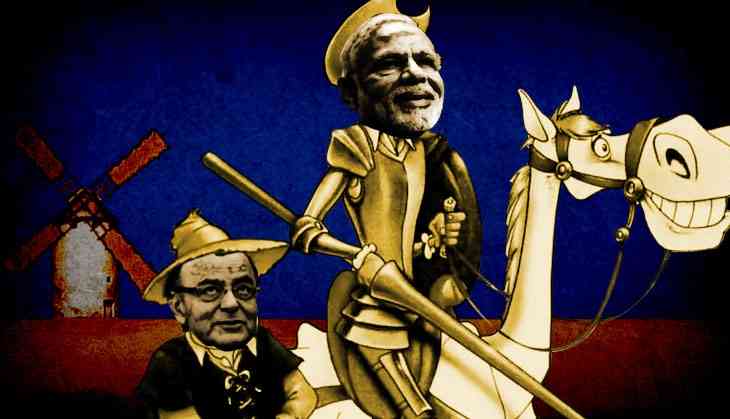Forget ease of doing business, Modi Raj reflects return of command economy

It is not just Prime Minister Narendra Modi’s Bonapartist impulses and Quixotic decision making, exemplified by demonetisation, that have played havoc with the economy. Another big problem is the institutional mindset—the mindset is undoubtedly statist. The Leviathan roars.
In India, it is very simple. From top ministers to regulators to anybody holding public office throw various commandments at the producing classes, be it farmers or corporations. The sum and substance of the commandments is: “We’ll tell you what you should do.”
This is ‘command economy 2.0’. Unlike the classical command economy, now the government doesn’t actually own most resources and large companies; 2.0 is about controlling rather than owning the means of production; it is about laying down the rules and regulations for producers and service providers in an almost unilateral fashion.
Modi seems to have confused 2014’s massive electoral mandate with a divine right to rule. From the perspective of his countless bhakts, this is obvious: he won the elections; so he has the divine authority to do whatever he wants. The narrative is that this great man, this selfless man who has sacrificed all for his motherland, knows what’s best for the people of India.
Elected in the world’s biggest democracy, he interprets rashtra-nirman (nation building) in whichever way he deems it fit. Everybody else—from his coterie to ministers, bureaucrats and businesspersons —just have to comply. It is not for them to reply, or ask for reasons. They just have to do and die.
Aside from Bonapartist unilateralism, there is the issue of the tyranny of suddenness. At the stroke of a pen, 86% of the country’s currency was declared illegal. There are many such sudden policy changes that surprised industry, though not so big as the November 8 announcement. And one thing that businessmen all over the world hate are surprises.
Modi’s surprises
A few instances: Two weeks ago, the Railways Ministry announced that General Electric should make electric engines rather than diesel ones. The implication was that the American firm’s 2015 contract, worth $2.6 billion for supply of 1,000 diesel locomotives, would end soon. This was despite the fact that GE had won the contract by way of competitive bidding. The project was the largest foreign direct investment in India by an American company and the first one going to an overseas firm after India allowed 100% FDI in railways. It was supposed to boost not only infrastructure but also give a big fillip to the Make in India programme.
The ministry’s rationale was that speeding up the electrification process would help cut down the Rs 16,000 crore that are being spent on diesel. Railway Minister Piyush Goyal said, “We are giving a relook to the ways of speeding up the electrification process” of rail lines across the country. It was only after GE’s protest and general criticism, and perhaps pressure from Washington, that the government rolled back its decision.
Then there is Road Transport Minister Nitin Gadkari who, about a month ago, had the grace of telling the Society of Indian Automobile Manufacturers (Siam) at a function organized by them, “You may not like it, but I wish it from my heart that your growth should be less.”
Was he serious? For the India Brand Equity Foundation (IBEF), a trust established by the government of India, proudly proclaims, “The Indian auto industry is one of the largest in the world. The industry accounts for 7.1% of the country’s Gross Domestic Product (GDP)… India is also a prominent auto exporter and has strong export growth expectations for the near future… several initiatives by the government of India and the major automobile players in the Indian market are expected to make India a leader in the 2W and Four Wheeler (4W) market in the world by 2020.”
So, what on earth does the government want? Low auto industry growth, as the honourable minister said? Or high growth, which the official website says? If UPA-2 was characterised by policy paralysis, a defining feature of the Modi regime is policy confusion—from the auto sector to demonetisation to the Goods & Services Tax (GST).
There are other ministers, too, who are determined to make the lives of entrepreneurs miserable. Consumer Affairs & Food Minister Ram Vilas Paswan is one of them. A few months ago, he came up with the proposal that hotels and restaurants should mention portion sizes of food served. Like every other move, the intentions were good—to prevent wastage of food. As Paswan told the media, “If a person can eat only two prawns, why should he or she be served six? If a person eats two idlis, why serve four! It’s wastage of food and also money people pay for something that they don’t eat.”
Statism percolates downwards. Earlier this year, the Food Safety and Standards Authority of India (FSSAI) showed enthusiasm by trying to force restaurants to disclose nutritive and calorific value of the food they serve. In May, the FSSAI wanted all packaged food items to clearly mention what percentage of your recommended daily nutrients intake is met in a single serving of that particular item.
A big, if not the biggest, reason for the economic slowdown is businesspersons losing interest in it. The way the Modi government is being run, it is unlikely to attract many investors. Forget overseas or private investors, the state-run companies are also sitting on a pile of cash but are wary to investing in the country. Running companies in India is becoming increasingly difficult, Bonapartism and Quixotism making the matters worse. The government’s promises of enhancing the ease of doing business offer little comfort.
First published: 6 October 2017, 18:07 IST
